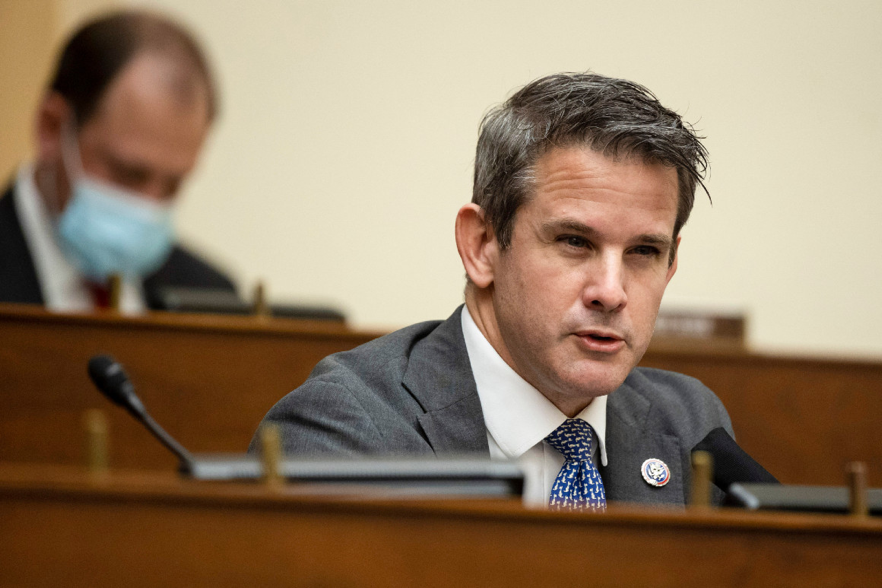The 45th president has brought new voices and voters to the party, but he’s driven them out too. Insiders fear the repercussions.
As Donald Trump ponders another presidential bid, top Republicans have grown fearful about what they’re calling the party’s “lost generation.”
In conversations with more than 20 lawmakers, ex-lawmakers, top advisers and aides, a common concern has emerged — that a host of national and statewide Republicans are either leaving office or may not choose to pursue it for fear that they can’t survive politically in the current GOP. The worry, these Republicans say, is that the party is embracing personality over policy, and that it is short sighted to align with Trump, who lost the general election and continues to alienate a large swath of the voting public with his grievances and false claims that the 2020 election was stolen.
Trump has driven sitting GOP lawmakers and political aspirants into early retirements ever since he burst onto the scene. But there was hope that things would change after his election loss. Instead, his influence on the GOP appears to be as solid as ever and the impact of those early shockwaves remain visible. When asked, for instance, if he feared the 45th president was causing a talent drain from the GOP ranks, former Florida Gov. Jeb Bush — perhaps inadvertently — offered a personal demonstration of the case.
“Thank you for checking in,” he replied. “I am out of politics and life is good.”
For Trump and his allies, this is a positive development. Establishment Republican politicians, in their estimation, were out of touch with the popular sentiment of Republican voters. And the degree to which Trump helped with that reorientation has been a good thing: realigning the party with working-class voters and encouraging a new cohort of non-traditional politicians to run for office. Many in the party point to lawmakers like Sen. Tim Scott, R-S.C., Sen. Josh Hawley, (R-Mo.), Florida Gov. Ron DeSantis and Rep. Elise Stefanik, (R-N.Y.) as a new era of GOP leaders.
But almost all of those up-and-comers have one common trait: they have embraced Trump. And for others in the party, that fealty is a sign of a party contracting, not expanding. The fear is that, as Trump lingers on the scene, aggressively intervening in internal party disputes and openly flirting with running again in 2024, it will only get more pronounced.
“There is a lost generation of conservatives and I think it’s because they’re forced to tie themselves to Trump,” one Republican operative said. “There was an anti-Romney backlash, anti-Bush backlash… When you lose the presidency — whether an incumbent or challenger — the party distances themselves and that is absolutely not the case here.”
Political parties have gone through concerns about talent drains before. At the end of Barack Obama’s presidency, Democrats warned that the bench of up-and-coming lawmakers he left behind was painfully thin as the party suffered tremendous setbacks in Congress and the statehouses. Trump, too, oversaw the loss of seats down-ballot. But unlike Obama, he has not receded from public view after leaving office. And his continued presence has sparked fears — mainly, but not exclusively, from the GOP diaspora — about the narrowing of the party.
“If the conservative cause depends on the populist appeal of one personality, or on second-rate imitations, then we’re not going anywhere,” former House Speaker Paul Ryan, who left Washington for Wisconsin two years ago, said last week on the first night of the Ronald Reagan Presidential Library & Museum’s “Time for Choosing” series. “Voters looking for Republican leaders want to see independence and mettle. They will not be impressed by the sight of yes-men and flatterers flocking to Mar-a-Lago.”
In a clear sign Trump was listening, the ex-president responded with a four-paragraph critique the next day. “Paul Ryan has been a curse to the Republican Party,” Trump said. Ryan didn’t respond back.
Ryan’s fear about Trump’s grip on the party is shared by top operatives who believe that few aspiring presidential candidates will choose to run if Trump ultimately does make a bid. So far, former New Jersey Gov. Chris Christie is the only potential 2024 contender who said he wouldn’t wait around for the ex-president to make a decision first. Former U.N. Ambassador Nikki Haley has flatly said she’d defer to her former boss before deciding on making a run.
As one close adviser coolly remarked:“They’re all so afraid [of] going first maybe? Or saying something that sounds like they’re moving on from the Trump years.”
On the congressional level, Trump’s impact on the composition of the party has been visible in obvious and subtle ways. He helped orchestrate the ouster of Wyoming Rep. Liz Cheney from leadership ranks, and either directly or indirectly drove numerous lawmakers to retirement. As FiveThiryEight noted, “of the 293 Republicans who were serving in the Senate or House on Jan. 20, 2017 — the day of Trump’s inauguration — a full 132 (45 percent) are no longer in Congress or have announced their retirement or resignation.”
“Rational, good quality candidates don’t want to associate with people like Marjorie Taylor Green. So people just check out,” said Mike Madrid, a Republican strategist who was a co-founder of the anti-Trump Lincoln Project before stepping down in December.
And it’s not just potential lawmakers; it’s younger Republican voters, too. Research from Pew, as highlighted by The New York Times, showed that “from December 2015 to March 2017, nearly half of Republicans under 30 left the party…many returned, but by 2017, nearly a quarter of young conservatives had defected.”
Michael Steele, former Republican National Committee Chairman and Trump critic, said it is a “legitimate truth for the party to confront.” Republicans “run a huge risk of losing not one but maybe a couple of generations of voters who are coming of age and maturing politically.”
The trend could continue through the coming midterms. The possibility that Trump may be a drag on the party in competitive districts has worried even mainstream Republicans supportive of the former president. “What is so concerning about next year’s midterm elections for Republicans is we cannot win without the Trump supporters, and yet, if this continuing obsession with a stolen election and a fraudulent election continues, it will hurt us in our ability to attract some of those voters who abandoned Trump in 2020 and try to get them back, especially in the suburbs,” said Dick Wadhams, a former Colorado Republican Party chair and longtime party strategist.
When those GOP lawmakers not toeing the MAGA line have decided to take the plunge into electoral politics, they’ve been drubbed. Earlier this month, Michael Wood, a combat veteran and small business owner who ran on an anti-Trump platform in a special election to fill the seat of the late Rep. Ron Wright (R-Texas) that he called “the first battle in this war to take back our party.”
But it wasn’t much of a battle. Wood barely registered with about three percent of the vote.
“In my darker moments, I think the only way the party is going to get the message is by losing and losing and losing,” Wood said.
Others in the party share the fear that the incentive structures Trump has put in place will lead to unelectable candidates winning nominations and losing general elections.
“We have 50 car pileup in the Pennsylvania and Ohio Senate Republican primaries with people trying to out-MAGA each other for an endorsement, and it could end up us losing the 2.5 points we need to win in the end,” warned Republican donor Dan Eberhart.
Trump allies scoff at the complaints, noting that Republicans lost winnable Senate runoff contests in Georgia while Trump wasn’t on the ballot but candidates blessed by the GOP establishment were. They argue Trump has ushered in a new wave of MAGA-leaning lawmakers and has motivated previously untapped voters, who agree with his America-first, populist message, to head to the polls. A spokesperson for Trump did not return a message asking for comment.
But operatives say that Trump’s impact down ballot isn’t measured just electorally but behaviorally; that he has stunted the growth of GOP lawmakers by forcing them to adopt political personas that pigeonhole their careers. Rep. Adam Kinzinger (R-Ill.) is held up as one prime example of this: a young Republican whose reputation went from that of a national security-minded rising star to a prominent Never Trump voice with limited room for intraparty growth.
Former House Speaker Newt Gingrich made the case that “there’s plenty of room for moderates in traditional political terms” with Trump still at the helm of the party. But, he added, there was only “limited room for overt, aggressive anti-Trump Republicans. Not because of Trump but because of the voters. Trump doesn’t have to orchestrate the hostility people are running into.”
Where evidence of a lost generation of GOP talent is hardest to see may be at the local level. In several states, Republicans who did not back Trump’s questioning of the election results have either announced that they are leaving office or face formidable hurdles for reelection. Others aren’t entering at all. Many will be replaced by pro-Trump lawmakers, almost certain to get elected in heavily-Republican counties, states or districts. But in certain cases, that’s caused the party headaches. Less visible are those instances when a Republican candidate that could have won a toss-up race decided not to run at all
Former Rep. Trey Radel — no stranger to being forced from elected office — said he personally knew people who had been inclined to run for commissioner posts but decided against it because of the pressures and scrutiny that comes with being in politics today. Radel blamed much of that on an unscrupulous media ecosystem and purity tests from both parties. But he also acknowledged that Trump’s brand of bare-knuckled politics was a major factor too.
“There is a difference between authenticity and blatantly trying to fuck somebody up, or attack someone, however you want to phrase it,” he said. “While I think that Donald Trump has done enormously positive things for the Republican Party, the landscape because of the way that both parties are acting now, has radically changed since I was in office.”




